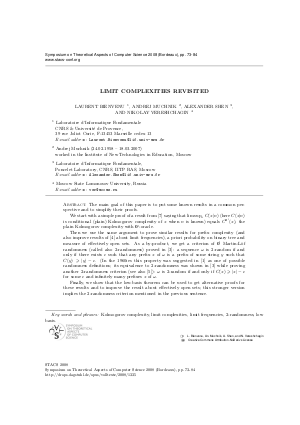Limit complexities revisited
Authors Laurent Bienvenu, Andrej Muchnik, Alexander Shen, Nikolay Veraschagin
-
Part of:
Volume:
25th International Symposium on Theoretical Aspects of Computer Science (STACS 2008)
Part of: Series: Leibniz International Proceedings in Informatics (LIPIcs)
Part of: Conference: Symposium on Theoretical Aspects of Computer Science (STACS) - License:
 Creative Commons Attribution-NoDerivs 3.0 Unported license
Creative Commons Attribution-NoDerivs 3.0 Unported license
- Publication Date: 2008-02-06
File

PDF
LIPIcs.STACS.2008.1335.pdf
- Filesize: 166 kB
- 12 pages
Document Identifiers
Subject Classification
Keywords
- Kolmogorov complexity
- limit complexities
- limit frequencies
- 2-randomness
- low basis
Metrics
- Access Statistics
-
Total Accesses (updated on a weekly basis)
0PDF Downloads0Metadata Views
Abstract
The main goal of this paper is to put some known results in a
common perspective and to simplify their proofs.
We start with a simple proof of a result from (Vereshchagin, 2002)
saying that $limsup_{nKS(x|n)$ (here $KS(x|n)$ is conditional
(plain) Kolmogorov complexity of $x$ when $n$ is known) equals
$KS^{mathbf{0'(x)$, the plain Kolmogorov complexity with
$mathbf{0'$-oracle.
Then we use the same argument to prove similar results for prefix
complexity (and also improve results of (Muchnik, 1987) about limit
frequencies), a priori probability on binary tree and measure of
effectively open sets. As a by-product, we get a criterion of
$mathbf{0'$ Martin-L"of randomness (called also $2$-randomness)
proved in (Miller, 2004): a sequence $omega$ is $2$-random if and
only if there exists $c$ such that any prefix $x$ of $omega$ is a
prefix of some string $y$ such that $KS(y)ge |y|-c$. (In the
1960ies this property was suggested in (Kolmogorov, 1968) as one of
possible randomness definitions; its equivalence to $2$-randomness
was shown in (Miller, 2004) while proving another $2$-randomness
criterion (see also (Nies et al. 2005)): $omega$ is $2$-random if
and only if $KS(x)ge |x|-c$ for some $c$ and infinitely many
prefixes $x$ of $omega$.
Finally, we show that the low-basis theorem can be used to get
alternative proofs for these results and to improve the result
about effectively open sets; this stronger version implies the
$2$-randomness criterion mentioned in the previous sentence.
Cite As Get BibTex
Laurent Bienvenu, Andrej Muchnik, Alexander Shen, and Nikolay Veraschagin. Limit complexities revisited. In 25th International Symposium on Theoretical Aspects of Computer Science. Leibniz International Proceedings in Informatics (LIPIcs), Volume 1, pp. 73-84, Schloss Dagstuhl – Leibniz-Zentrum für Informatik (2008)
https://doi.org/10.4230/LIPIcs.STACS.2008.1335
BibTex
@InProceedings{bienvenu_et_al:LIPIcs.STACS.2008.1335,
author = {Bienvenu, Laurent and Muchnik, Andrej and Shen, Alexander and Veraschagin, Nikolay},
title = {{Limit complexities revisited}},
booktitle = {25th International Symposium on Theoretical Aspects of Computer Science},
pages = {73--84},
series = {Leibniz International Proceedings in Informatics (LIPIcs)},
ISBN = {978-3-939897-06-4},
ISSN = {1868-8969},
year = {2008},
volume = {1},
editor = {Albers, Susanne and Weil, Pascal},
publisher = {Schloss Dagstuhl -- Leibniz-Zentrum f{\"u}r Informatik},
address = {Dagstuhl, Germany},
URL = {https://drops.dagstuhl.de/entities/document/10.4230/LIPIcs.STACS.2008.1335},
URN = {urn:nbn:de:0030-drops-13350},
doi = {10.4230/LIPIcs.STACS.2008.1335},
annote = {Keywords: Kolmogorov complexity, limit complexities, limit frequencies, 2-randomness, low basis}
}
